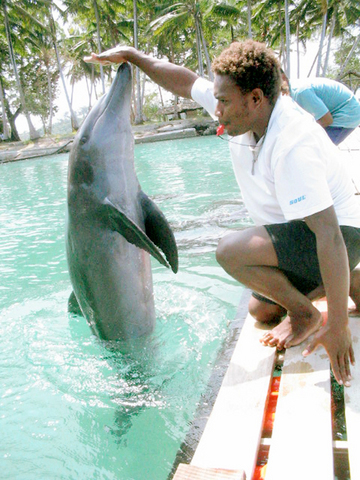New Zealand's prime minister has written to the Solomon Islands government seeking an assurance that it won't resume dolphin exports amid reports that up to 40 of the mammals held in captivity in the Pacific island nation are to be traded soon.
A senior New Zealand diplomat in the Solomon Islands' capital of Honiara said yesterday his country has been given "several high-level assurances" that the Cabinet's ban on dolphin exports remains in force.
The high-level contacts, including a letter from Prime Minister Helen Clark to her Solomons counterpart, Allan Kemakeza, follow reports in recent weeks that up to 40 dolphins held in captivity in the islands are to be exported shortly.

PHOTO: AP
Uproar
An international uproar erupted in 2003 over a shipment of 28 dolphins transported by airplane from the Solomon Islands to Mexico.
Environmentalists argued the sale was illegal under the Convention on International Trade in Endangered Species (CITES), and should have been stopped by authorities in Mexico.
People involved in the shipment said exports were not illegal under Solomon Islands law. Animal campaigners maintain the practice is illegal under international law.
"There does seem to be strong indications that there are people in the Solomon Islands, in spite of all the promises made by their government, who are prepared to export two lots of 20 dolphins each to the Bahamas," said Chris Carter, New Zealand's Conservation Minister, yesterday.
A step backward
"Helen Clark has written to the prime minister of the Solomons pointing out that the Solomon Islands' government has said they won't export dolphins," he told TV3 News.
He said New Zealand is not confident that the exports can be prevented under current international law controlling trade in protected species, but any export would be a big step backward for the island state.
If the exports occur, "the European Union will ban tuna exports from the Solomons to Europe. It will really hurt the Solomons if this takes place," the minister said.
Smuggling?
Kimberly Muncaster, the World Society for Protection of Animals' regional manager in New Zealand, said yesterday the group had been told by reliable sources who had alerted them to the 2003 shipment plans, that the dolphins could be taken out of the country on two separate chartered flights passing through Fiji, Tahiti and Mexico en route to the Bahamas.
Muncaster said with the Solomon Islands' Cabinet ban in place, any dolphin export "will contravene local law and therefore be illegal under CITES."
A New Zealand diplomat in Honiara, speaking on condition of anonymity, said that New Zealand "has had several high-level assurances that the export ban is in place."
Kemakeza, the prime minister of Solomon Islands, also assured the island nation's parliament last week that the Cabinet ban on live dolphin exports remains in force.

Former Nicaraguan president Violeta Chamorro, who brought peace to Nicaragua after years of war and was the first woman elected president in the Americas, died on Saturday at the age of 95, her family said. Chamorro, who ruled the poor Central American country from 1990 to 1997, “died in peace, surrounded by the affection and love of her children,” said a statement issued by her four children. As president, Chamorro ended a civil war that had raged for much of the 1980s as US-backed rebels known as the “Contras” fought the leftist Sandinista government. That conflict made Nicaragua one of

COMPETITION: The US and Russia make up about 90 percent of the world stockpile and are adding new versions, while China’s nuclear force is steadily rising, SIPRI said Most of the world’s nuclear-armed states continued to modernize their arsenals last year, setting the stage for a new nuclear arms race, the Stockholm International Peace Research Institute (SIPRI) said yesterday. Nuclear powers including the US and Russia — which account for about 90 percent of the world’s stockpile — had spent time last year “upgrading existing weapons and adding newer versions,” researchers said. Since the end of the Cold War, old warheads have generally been dismantled quicker than new ones have been deployed, resulting in a decrease in the overall number of warheads. However, SIPRI said that the trend was likely

NUCLEAR WARNING: Elites are carelessly fomenting fear and tensions between nuclear powers, perhaps because they have access to shelters, Tulsi Gabbard said After a trip to Hiroshima, US Director of National Intelligence Tulsi Gabbard on Tuesday warned that “warmongers” were pushing the world to the brink of nuclear war. Gabbard did not specify her concerns. Gabbard posted on social media a video of grisly footage from the world’s first nuclear attack and of her staring reflectively at the Hiroshima Peace Memorial. On Aug. 6, 1945, the US obliterated Hiroshima, killing 140,000 people in the explosion and by the end of the year from the uranium bomb’s effects. Three days later, a US plane dropped a plutonium bomb on Nagasaki, leaving abut 74,000 people dead by the

Indian Prime Minister Narendra Modi is to visit Canada next week, his first since relations plummeted after the assassination of a Canadian Sikh separatist in Vancouver, triggering diplomatic expulsions and hitting trade. Analysts hope it is a step toward repairing ties that soured in 2023, after then-Canadian prime minister Justin Trudeau pointed the finger at New Delhi’s involvement in murdering Hardeep Singh Nijjar, claims India furiously denied. An invitation extended by new Canadian Prime Minister Mark Carney to Modi to attend the G7 leaders summit in Canada offers a chance to “reset” relations, former Indian diplomat Harsh Vardhan Shringla said. “This is a